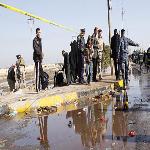A suicide-bomber handing out food and pastries blew himself up near a security checkpoint outside the mainly Shi'ite Iraqi port city of Basra, killing at least 53 people and wounding at least 137 others.
The attack targeted Shi'ite worshipers who had turned out for Arbaeen, a major religious celebration which commemorates the slaying of Imam Hussein, one of Shi'ite Islam's most revered figures.
Firefighters hosed down the pavement along the road where the bombing took place, as workers removed pieces of food, shoes and clothing from the scene of the explosion. Dozens were killed and wounded in the blast, but government TV showed only the cleanup.
Witnesses initially reported that a policeman blew himself up near a checkpoint, but security officials insisted that the culprit was a food vendor. Ali Maliki, who heads the Basra security commission stressed that stringent safety measures are causing the terrorists to change tactics.
Maliki said that terrorists were unable to detonate car bombs or roadside bombs, so they found a new trick, using someone carrying a container of food and pastries who began handing them out to (pilgrims), causing people to gather around him.
General Osman al-Ghanemi, who heads the Central Euphrates military district told al-Hurra TV that 17.5 million Shi'ite pilgrims visited the holy sites at Karbala and Najaf for the pilgrimage and that a government security plan curbed the usual threat of car bombs and roadside blasts:
Al-Ghanemi said that the security plan was implemented, amid major threats, and it involved searching visitors and evacuating them from three different sites by day's end. He says that bomb detection equipment helped prevent car bombings and insisted that several car bombs were found before they went off.
Iraqi TV noted that most of the victims of the blast were Shi'ite pilgrims visiting a mosque near Basra, rather than the main holy site at Karbala.
Khattar Aboud Diab, who teaches political science at the University of Paris, notes that the Sunni Shi'ite conflict dates back to the Battle of Karbala in 680 AD, but that fresh violence has been brewing since recent attempts by Shi'ite Prime Minister Nouri al-Maliki to arrest his Sunni vice president, Tareq al-Hashemi.
Diab said that for many observers in the Arab world and in the West, Iraq is now governed by the Shi'ites and by Shi'ite Prime Minister Maliki, who many say is governing like former leader Saddam Hussein. Diab argued thia has caused a radicalization of the Sunni community, which lost some clout after being vanquished in the 2004-2007 civil strife.
Abou Diab also said that the Sunni community has been struggling to regain some of its lost power and prestige in the wake of the recent crisis involving Sunni Vice President Tareq al Hashemi. Hashemi fled to Kurdistan after Prime Minister Maliki tried to have him arrested.
